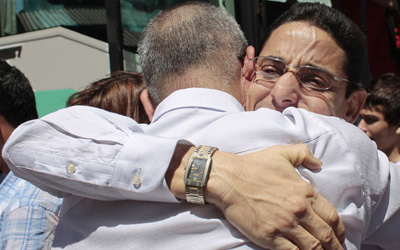New York, July 14, 2010—Two more Cuban journalists were freed from prison and flown to Madrid today, a day after the arrival there of six colleagues, as part of an extensive release of imprisoned dissidents by the Cuban government.
Omar Rodríguez Saludes and Normando Hernández González, Cuban journalists jailed in March 2003, arrived with their families around 1.30 p.m. local time on an Iberia flight, news reports said. Both reporters were driven to a hotel in the neighborhood of Vallecas, in Madrid, where they joined six colleagues who had been freed and exiled to Spain on Tuesday, the news agency Europa Press said.
In a telephone interview with CPJ, Hernández said he was still shocked by his release and exile to Spain. “There are no words to fairly describe how amazed and excited I was when I saw myself free and next to my wife and daughter again,” said Hernández, whose health had severely deteriorated amid inhumane prison conditions.
Rodríguez told CPJ that he was very happy, but still deeply affected by his seven years in jail. Both reporters expressed great sadness at leaving their country. “Although I feel very happy for having the possibility to stay with my family again, I am very sad at the same time because I had to leave Cuba,” Rodríguez said.
Before being arrested, Rodríguez was director of the Havana-based independent news agency Nueva Prensa Cubana, while Hernández was director of the news agency Colegio de Periodistas Independientes in the province of Camagüey.
With Hernández’s and Rodríguez’s arrival, a total of eight Cuban imprisoned journalists have been released and brought to Spain as part of an agreement between the government of President Raúl Castro and the Catholic Church in Cuba.
In a statement issued last week, the church announced that the Cuban government had agreed to free a total of 52 political detainees. Spanish Minister of Foreign Affairs Miguel Angel Moratinos, who also participated in the negotiations over the release, appeared to go further on Tuesday, telling a congressional committee in Madrid that all of Cuba’s political prisoners would be freed, the Spanish news agency EFE reported. Cuban human rights defenders say there are more than 150 political prisoners in all.
Prior to this week’s releases, CPJ research had identified 21 journalists in Cuban prisons for their independent reporting and commentary. All but one of the journalists had been detained in March 2003, in the massive government crackdown on political dissent and independent journalism that came to be known as the Black Spring.
Below are CPJ capsule reports on the journalists who arrived in Spain today after their release. The capsule reports are from CPJ’s annual census of jailed journalists, conducted in December 2009.
Omar Rodríguez Saludes, Nueva Prensa Cubana
Imprisoned: March 18, 2003
Rodríguez Saludes, director of the Havana-based independent news agency Nueva Prensa Cubana, was arrested in March 2003 and summarily tried in April under Article 91 of Cuba’s penal code for “acting against the independence or the territorial integrity of the state.” Cuban authorities handed him a 27-year prison sentence.
Rodríguez Saludes, 44, was a well-known photographer who also reported and wrote. He was being held at Toledo Prison in Havana, where he was allowed just one visit every month, according to Laura Pollán Toledo, a human rights activist and wife of imprisoned journalist Héctor Maseda Gutiérrez.
According to his wife, Ileana Marrero Joa, the journalist had been diagnosed with gastrointestinal problems and hypertension.
Normando Hernández González, Colegio de Periodistas Independientes de Camagüey
Imprisoned: March 19, 2003
Hernández González was arrested in March 2003 as part of the massive crackdown on Cuba’s dissidents and independent press. The director of the news agency Colegio de Periodistas Independientes de Camagüey was sentenced the following month to 25 years in prison under Article 91 of the penal code.
Hernández González was held in an isolation cell at the maximum-security Kilo 7 Prison in his home province of Camagüey for much of the year, his mother, Blanca González, told CPJ. He spent all but two hours a week alone, and received family visits only once every 45 days, she said. The journalist was diagnosed with intestinal ailments, and has suffered from pneumonia and knee problems so severe that even standing was difficult, his mother said. In November, doctors also diagnosed Hernández González with several cardiovascular ailments.
Hernández González was moved to the hospital at Combinado del Este Prison in late October, said Oscar Espinosa Chepe, a formerly jailed journalist. His wife, Yaraí Reyes Marín, told CPJ that she requested medical parole for her husband in July 2006, but Cuban authorities did not respond.
